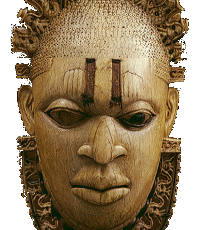People of the forest
Before humans beings took up agriculture, we all gathered our food or we hunted it. There are small groups of hunters and gatherers throughout the world to this day – and many of them live in Africa. This includes some 900,000 Pygmies of the jungles of Central Africa, but also groups such as the San people of the Kalahari desert and the Hadza of Tanzania. The people of the forest are the remnants of the original inhabitants of central Africa who were displaced when the Bantu people arrived. There is still a lot of tension between the two groups. The Bantu people are farmers who live sedentary lives and the people of the forest rely on them for everything that nature does not provide. The Pygmies of Congo often live in the proximity of a village of farmers but as soon as new sources of food supply become available they disappear into the forest. The Bantu often think of them as unreliable. The Pygmies, for their part, often think of the Bantu farmers as overbearing and rather gullible.
Sedentary people always look down on people who move around in order to make a living, but they also romanticize their lives. The hunters and gatherers of Africa are no exception. One expression are the “paleolithic diets” which recently have become fashionable in Europe and North America. People who follow a paleolithic diet shun agricultural products like cereal and milk and eat only the kind of food that can be hunted or gathered. The presumption is that our bodies are better adjusted to the kind of food that we consumed during the 95 percent of human history. “Paleolithic diet” is one of Google’s most searched-for weight-loss methods.
Another expression is a brand of political activists known as “anarcho-primitivists.” Their ideal is a society organized as those of hunters and gatherers. Civilization, they argue, was a mistake, and so was the state and the very notion of history. Many anarcho-primitivists predict that a catastrophe of some kind one day will occur – perhaps as the result of a cataclysmic war or an environmental collapse. After that the humans who survive will have to return to Africa and to the only form of life which is sustainable in the long term. The societies of hunters and gatherers who live there today are thus not the remnants of some distant past but models of our future.
External links
- !Khwa ttu
- “Kiss of life for DR Congo pygmies”
- Ben Etherington, “The New Primitives,” Los Angeles Review of Books
- Colin Turnbull, The Forest People
- Kalahari Peoples' Fund
- Marshall Sahlins, “Notes on the Original Affluent Society,” 1968
- Pygmy Survival Alliance
- San Culture: Written in the Sand
- Smithsonian.com, “The Pygmies’ Plight”
- Survival International: Bushmen
- Survival. org, “The ‘Pygmies'”
- The San Bushmen of the Drakensberg Mountains
- www.pygmies.org

